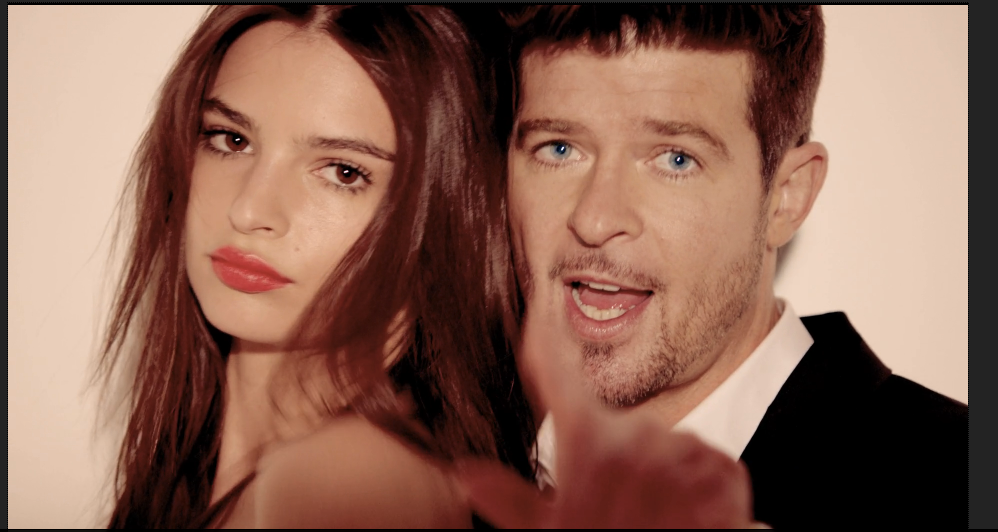Rapists everywhere now have an anthem, and it’s Robin Thicke’s new summer track featuring Pharrell and rapper T.I., “Blurred Lines.” At least that’s what critics of the song want you to believe.
The single, which is at the top of the Billboard charts, has been garnering nothing but negative attention—with many slamming the song as misogynistic and, as the Daily Beast’s Tricia Romano put it, “kind of rapey.” But does “Blurred Lines” really reek of rape? Is the phrase “blurred lines” actually a reference to blurred (or a lack of) sexual consent?
Not at all. While it’s true that the song’s music video undoubtedly objectifies women (the infamous NSFW version features three topless models parading around in nude thongs next to the fully dressed male singers, while the SFW version predictably uses scantily clad models instead) the video—and the song itself—are far from being “rapey.”
It seems most critics have an issue with the lyric “I know you want it,” which is repeated over and over again by Thicke in the chorus of the song. In April, Feminist In L.A. blogger Lisa Huyne, who was one of the first to refer to the song as a “rape” song, wrote: “Basically, the majority of the song … has the R&B singer murmuring ‘I know you want it’ over and over into a girl’s ear. Call me a cynic, but that phrase does not exactly encompass the notion of consent in sexual activity … “
What? Someone who says “I know you want it” is probably overly cocky and presumptuous as hell by assuming you/she wants “it,” but nothing about “I know you want it” is saying “I know you want it, and I’m going to force you to have it” or “I had sex with you and you didn’t consent, but I know you wanted it.” Yes, “I know you want it” could be said by a rapist—but so could “Do you want to go to a movie tonight?”
If you want more proof that the repetitive “I know you want it” chorus isn’t creepy, let’s do a closer reading of the other lyrics. The end of the chorus goes: “The way you grab me/ must wanna get nasty/ go ahead, get at me.” The last part, “go ahead, get at me” very clearly kills any “rapey” vibe. In fact, he’s putting the ball in her court by telling her to make the move and not the other way around. He’s saying, “You’re clearly turned on by me. Go for it.” (Again: Douche? Sure. Rapist? Probably not.)
There’s more of this “get at me” action throughout the song. Take, for example, T.I.’s bit at the end, which goes: “So I’m just watchin’ and waitin’/ for you to salute the truly pimpin’/ Not many women can refuse this pimpin’.” He’s waiting for her to make the move! To salute the “truly pimpin’”!
I’ve listened to the song a few hundred times (yeah, I like it, and I don’t find it any more offensive than other R&B songs), and I really can’t imagine it depicting anything more than a flirtatious scenario in which a cocky guy (we all know the type) teases a girl who’s flirting back (she’s hugging him and grabbing at him, according to the lyrics). While she may want to play up her “good girl” persona, Thicke tells her it’s OK to be a bad girl and unleash (or indulge in) her animalistic sexual side. And really, girl, it’s OK! (Though you could do better.)
Here’s Thicke, telling her how he’s different from her last guy: “OK, now he was close/ tried to domesticate you/ but you’re an animal/ Baby, it’s in your nature/ just let me liberate you/ You don’t need no papers/ that man is not your maker.” And T.I. raps about this later: “Nothin’ like your last guy, he too square for you/ He don’t smack that ass and pull your hair for you.”
Is Thicke being kind of a dick by assuming he could “liberate” her? Yes. But is he forcing her to do anything? No. Is it possible that a woman would be turned on by the prospect of what he’s explicitly offering to her? Absolutely. Is this all about fun, consensual, kinky sex? Yep. As XOJane’s Grace Rasumus put it, “these lyrics seem more like temptation after a lame relationship as opposed to impending sexual assault.”
And as for the “blurred lines” lyric? The lines here aren’t between rape and consensual sex. As others have pointed out—and as Thicke mentioned in an interview with Billboard—it could definitely refer to the tired, overused good-girl-with-a-freaky-streak fantasy. Or, perhaps it really is about getting mixed signals from a lady who you think might be interested in doing the deed—and then letting her know exactly where you stand so she can make the next move—if she wants.
